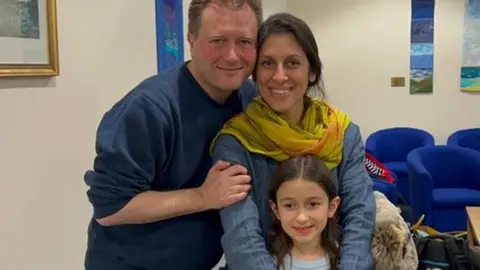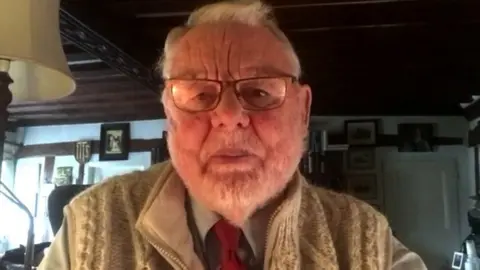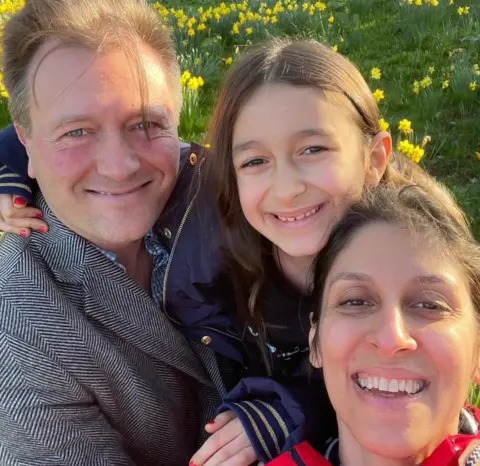Nazanin Zaghari-Ratcliffe's release: Learning to live with freedom
 BBC
BBCAfter nearly six years of detention in Iran, Nazanin Zaghari-Ratcliffe has been reunited with her family. But how does someone return to normal life after a such a long period in confinement and what comes next?
"Take it gently," says former hostage Terry Waite, who spent nearly five years in captivity in Lebanon.
He compares the experience of a captive adjusting to normal life to a diver returning to the surface, adding: "Come up too quickly you get the bends. If you come out gently you'll be fine."
Mr Waite was freed in 1991 and later set up charity Hostage International, which supports released hostages and their families.
"It has been very difficult for Nazanin because of so many of the uncertainties - threatened with being rearrested, threatened with a longer term of imprisonment and never knowing," he says.
"And somehow she's had to learn how to live one day at a time."

Mr Waite says it took him about 12 months to really get back into life after his release.
"The whole experience they have been through has to be processed. Sometimes people need professional help from that, some do not. But they just need time."
Mrs Zaghari-Ratcliffe, 43, returned to the UK from Tehran after her release was secured on Wednesday following months of negotiations.
It marked the end of an ordeal that saw Mrs Zaghari-Ratcliffe detained after being accused in 2016 of plotting to overthrow the Iranian government. She always denied the claim.

More on the freed British-Iranians

Hostage International chief executive Lara Symons says the return home comes with lots of difficulties.
"The spotlight is on you and everybody now sees you as a former hostage, and whatever you do with your life going forward you will be remembered as that former hostage," she says.
"You have that label - that badge - and you have to learn to wear that, and carry it because people see you through that prism.
"That can be very difficult and it's a challenge, but can be turned into something positive as you see with Terry Waite."
She says people often have to learn how to take control of their own lives again and warns that even the most mundane tasks can pose challenges.
"People who have been in captivity whether they've been held by a criminal kidnapping group or imprisoned by a state, they haven't had the power to make their own decisions.
"I've heard hostages say on their return home they were offered chicken or pasta on airplane, and they couldn't make that decision.
"The brain has to get use to adapting to being a free person and freedom of choice."

Lela Tsiskarishvili, psychologist and president of International Rehabilitation Council for Torture Victims (IRCT), agrees.
"Things that might seem very simple can be very difficult for them to engage in," she says.
"Often because the way the brain works means they are still in the past because of all the memories, preventing them being now and here in the present."
During her captivity, the charity Redress said Mrs Zaghari-Ratcliffe needed urgent medical treatment for her mental health.
And Ms Tsiskarishvili, who has two decades of experience treating survivors of torture in detention, says detention can lead to post-traumatic stress disorder, anxiety and depression.
"It's small steps and small victories because the experience can be so haunting," she says, adding: "Sometimes I'm in awe of the clients we work with with."

Ms Tsiskarishvili also warns it can be difficult for the families as well.
"It's difficult for children primarily. For parents it's also difficult to return to a kid who grew up several years later that there was limited contact with.
"It's almost getting to know each other again. There are also problems with partners."
Mrs Zaghari-Ratcliffe spent her first night in the UK in bed with her husband Richard and seven-year-old daughter Gabriella in a safe house, her sister-in-law Rebecca Ratcliffe says.
Barbara Ratcliffe, Mrs Zaghari-Ratcliffe's mother-in-law, says her granddaughter could not remember living with her mother and her son would find it hard adjusting too.
Tulip Siddiq, MP for Hampstead who helped campaign for the release, says: "Richard is an accountant from West Hampstead. He's not a man who expected to go on TV on hunger strike, lobbying the prime minster and going to No 10.
"They [Richard and Nazanin] are going to be very different people, and I think there will be a huge process in which they will have to get to know each other.
"But also Gabriella has to trust her mother again as well."
Ms Symons says she finds children often help former detainees get back into routine.
"Absolutely focusing on those small pleasures in life is a great way to start, and getting back into routine and having children in the family helps with that," she says.
"Children need routine so responding to that and having that to focus is really helpful.
"But yes it's a long journey and it will take time. It's all about taking it day-by-day.
"There is a positive light at the end."
